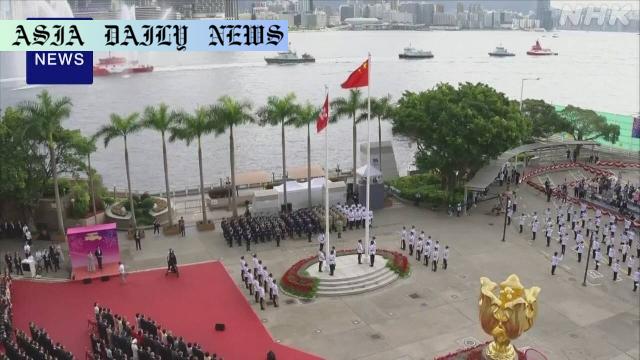Hong Kong: Chief Executive John Lee vows to safeguard national security while aiming for closer economic ties with China.
Hong Kong Chief Executive John Lee emphasizes tight societal control on the 28th anniversary of China’s handover.
The National Security Law has significantly curbed freedoms like speech and assembly in Hong Kong over the past five years.
Lee aims at integrating Hong Kong into China’s national development, promoting economic cohesion.
China will showcase its military strength by displaying its aircraft carrier Shandong in Hong Kong to foster patriotism.

Introduction: Hong Kong’s 28th Anniversary of Handover
On July 1, 2023, Hong Kong marked 28 years since its return to Chinese sovereignty following the cessation of British colonial rule. Over the decades, Hong Kong has witnessed significant changes in its governance and societal structure, especially after the implementation of the National Security Law in 2020. While the region was once synonymous with freedom of speech, assembly, and vibrant democratic movements, the narrative has shifted significantly, with tighter control from Beijing aimed at maintaining national security and fostering economic unity with China.
The Tightening Control Over Society
The Chief Executive of Hong Kong, John Lee, used the anniversary ceremony to reaffirm the government’s firm stance on safeguarding national security. Lee underscored the need to maintain strict societal controls while proactively integrating the region into China’s broader national development plans. Five years after the National Security Law was introduced, freedoms once central to Hong Kong’s identity — such as speech and mass demonstrations — have been heavily restricted. Annual July 1 protests, once synonymous with democratic voices, are now a remnant of the past in this increasingly security-conscious era.
Economic Integration with China
Lee also outlined his administration’s economic aspirations, focusing on economic integration with mainland China. As tensions continue to escalate between China and the United States over trade policies, Beijing is leveraging its influence in Hong Kong to encourage patriotism, particularly among the business community, urging stakeholders to contribute meaningfully to the state’s growth. Lee’s emphasis on aligning Hong Kong’s trajectory with China’s ongoing development initiatives underscores a push to solidify economic unity.
Symbolism in Military Presence
An intriguing layer to Hong Kong’s anniversary commemorations is the planned arrival of China’s aircraft carrier, the Shandong, set to dock in Hong Kong for public display. This event not only signifies sovereignty and military might but also acts as a medium for fostering patriotism among the residents. The carrier’s display is a reminder of Beijing’s presence and power, reinforcing the message of unity under the “one country, two systems” framework, albeit in a modified form compared to its original liberal promise.
Conclusion: A Transforming Identity
As Hong Kong continues to navigate this new chapter of its history, its identity as a hub of global commerce, innovation, and democracy has taken on a more subdued tone. The 28th-anniversary celebration underscores the tightening grip of Beijing’s influence and serves as a reflection of the evolving societal and economic priorities. While integration into China’s national framework is highlighted as an economic opportunity, the broader implications for freedoms and regional identity paint a complex picture of transformation and adaptation.
Commentary
Reflections on Hong Kong’s Current Trajectory
The announcement by Hong Kong’s Chief Executive John Lee during the 28th handover anniversary brings into sharp focus the shifting landscape of the region. Once a beacon of free speech, vibrant demonstrations, and a relatively autonomous governance structure, Hong Kong is now under even tighter control by Beijing. The emphasis on safeguarding national security and suppressing dissent reveals an intent to reshape Hong Kong’s identity in alignment with China’s vision.
The Role of Economic Alignment
Economic integration with China has been a longstanding goal for Beijing, and the latest developments further cement this trajectory. With growing geopolitical tensions, particularly with the United States, Hong Kong’s role as an economic hub is being reframed within a nationalistic narrative. This expectation for businesses to contribute to national development hints at a redefined relationship between the government and the private sector under the guise of patriotism.
Suppression vs. Sovereignty
The inclusion of military symbolism, particularly through the display of the Shandong aircraft carrier, is another clear indication of Chinese sovereignty and strength. While this may instill national pride for some, it also raises questions about the long-term social implications for the residents of Hong Kong, especially considering the deep cultural divide that still exists between Hong Kong and mainland China.
Final Thoughts
As we reflect on these developments, it is imperative to consider the intricate balance between national security and individual freedoms. Hong Kong’s evolution serves as a microcosm for broader geopolitical dynamics, illustrating the complexities of integrating global cities into a larger national framework. How this integration unfolds will be pivotal in shaping not only Hong Kong’s future but also its role on the global stage.


